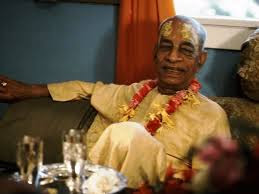If God has no form, then what you will hear about Him?
"In
the human society, there is always some kinds of religious institution. That is
called dharma, faith. Real dharma means—that I have already
explained—occupational duty. Constitutional duty, that is called dharma:
functional duty. So real dharma, real religion, is to become servant of
God, or to render service to God. That is real religion. But we have
manufactured so many religions: different societies, different circumstances,
different country.
Therefore
it is advised herewith that you may execute any kind of religious faith or . .
. (break) . . . principle, but the result should be . . . (break) . . .
perfect. You can say: "I am very perfectly executing the ritualistic
ceremonies and the tenets described in my scripture, Bible" or Veda or
Koran. That's very good. But what is the result? The result is that you must
develop or increase your tendency to hear about God. But if your ultimate truth
is impersonal . . . mostly they consider God has no form. Then if God has no
form, then what he'll hear about Him? Simply formless, formless, formless, how
can you . . . how long you can go thinking like this, "God is
formless"? If God is formless, then your idea of hearing about Him is
finished, because formless, there is nothing activities.
But
actually God is not formless. Several times I have explained. God has got His
form.
(aside)
What is that sound? (indistinct reply by devotee)
He
is person. He has got His activities. Therefore in the Bhagavad-gītā it
is said, janma karma, ajo 'pi sann avyayātmā bhūtānām īśvaro 'pi san (BG
4.6). Although He is aja . . . Nobody has to die, aja. Aja means
birth. Nobody takes birth. Either the living entity or God, na jāyate na
mriyate (BG 2.20). In the Bhagavad-gītā it is said that the
living entities—we are all living entities—na jāyate, they do not take birth,
neither they do die, na jāyate na mriyate vā kadācit, at any time. Then
what is this death and birth? The death and birth is simply change of the body,
the subtle body and the gross body.
Just
like every night we die. The gross body remains inactive on the bed, and the
subtle body takes me away. I dream, I go in the dreamland: I have gone to some
friend, I am talking with somebody, I am working in a different way. That is
our daily experience. This means that we have got two kinds of body. One body
is this gross body, and the other body is subtle body, made of mind,
intelligence and ego. So foolish person, they do not see the subtle body, but
the subtle body is there. Everyone will accept. I am working with my mind, intelligence
and ego. Everyone knows."
(Srila Prabhupada: Lecture on SB 1.2.8 -- New Vrindaban, September 6, 1972)




Comments
Post a Comment